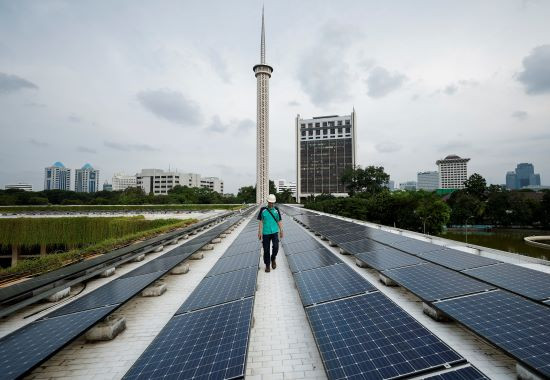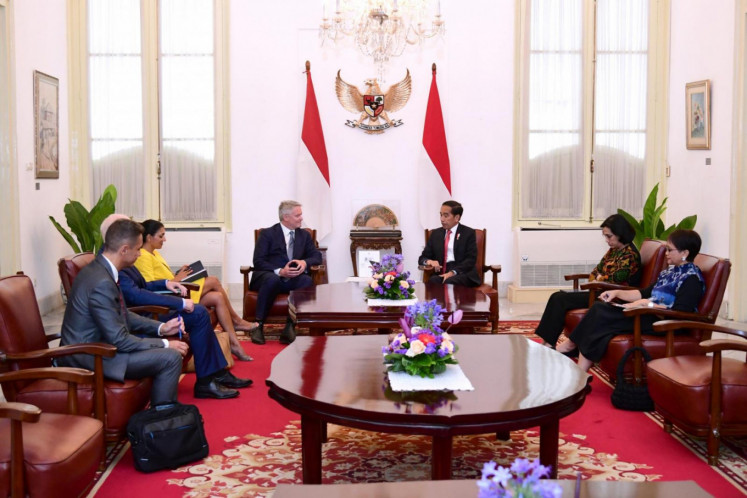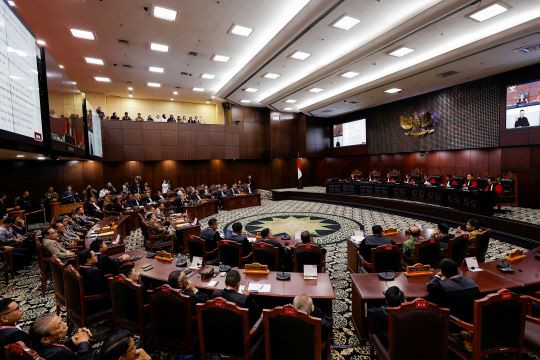Foreseeing Indonesia's awesome future
This is unlike the frequent conversation where “Indonesia is and will always remain a potential”.
Change Size
 Indonesia has many Jack Mas, Mark Zuckerbergs and Jeff Bezoses. (Shutterstock/File)
Indonesia has many Jack Mas, Mark Zuckerbergs and Jeff Bezoses. (Shutterstock/File)
T
icktock...ticktock... ticktock. The clock has been and will be ticking for Indonesia. Having gone through 400 years of Buddhism, 600 years of Hinduism and 700 years of a mixture of Islam, colonialism, Christianity, independence and democratization, it’s hard not to notice the relative peace and stability that Indonesia (and many parts of Southeast Asia) has lived through. This could lead one to argue that it is inevitable that peace and stability will continue.
Aside from peace and stability, we can highlight other observations that could serve as a backdrop for a bright future for the country and nation. And this is unlike the frequent conversation where “Indonesia is and will always remain a potential”.
We are globally witnessing an unprecedented period of low interest rates for both the short and long term, despite recent spikes in both the risk-free rates and the 10-year treasury yields. Actually they are the lowest in the last 5,000 years, with the last time we saw such lows being in 1930 preceding the Great Depression.
With global demographics the way they are, the aging population is going to end up putting a lot more of their savings into their post-retirement pool of funds, while the number of asset classes that the money can be invested in shall remain finite. Consequently, a decline in the price of money (more commonly known as the interest rate) is inevitable.
Indonesia’s tech scene has really pushed boundaries as nothing ever could before. Ideas are being thrown about at a speed that could really excite the young and future generations.
Indonesia has never really been bereft of great ideas nor creative instincts. The conundrum that stymied growth has always been a lack of access to capital to help put these great ideas into action.
Technological disruptions will change the way people access capital and, consequently, sooner rather than later, move today’s needle of financial inclusiveness from 36 percent (the percentage of people aged 15 or older that have bank accounts) to a much higher percentage faster than ever.
Indonesia has many Jack Mas, Mark Zuckerbergs and Jeff Bezoses. The quest is not so much to find them, but rather to ensure that these guys have access to capital — or more precisely, long-term capital. Because great ideas take time to materialize — it took Amazon more than 20 years to reach sustainable profitability.
The wisdom with which past and current governments have and are spending their tax rupiahs or dollars cannot go unnoticed.
With more than Rp 400 trillion (US$28.5 billion) being spent each on increasing physical connectivity and education last year, there is no reason or question that Indonesia is not going to get smarter, stronger and better.
Assuming linearity of the trajectory of growth of each of these two expenditures, a future value of the accumulation of each until 2045 is approximately $4 trillion (close to Rp 60,000 trillion today). And that is assuming a tax ratio (ratio of tax revenue to gross domestic product) remaining at 12 percent until 2045.
Any spike from this tax ratio would only mean incremental greatness for the nation by way of its spending on physical connectivity and education.
In a world that has become more bilateralized than ever (multilateral conversations on economic cooperation are certainly declining on the back of increasing populist narratives), it has become even more imperative for a nation to increase its marginal productivity on a purchasing power adjusted basis (for example, Indonesia at $23,000 per capita while Singapore at $123,000 per capita) in order to compete locally, regionally and globally.
Economic cooperation with anyone hinges and is tested upon how one shows the desire and capacity to improve marginal productivity.
Sporadic or episodic success typically translates not to lasting success, but rather to mediocrity, which can also be at the expense of resentment of the less gifted.
There is hope in the narrative compellingly changing for the better in the long term (notwithstanding the fact that there may still be aberrations in the short or midterm).
Indonesians must try to be more evenly optimistic as we have recently with unprecedented successes at the 2018 Asian Games. If only such events happened in this country with greater frequency.
Such optimism could start — with a backdrop of peace and stability, increasing financial inclusion and more and better spending on physical connectivity and education — with imagining a hypothetical (or rather aspirational) 2045 narrative as follows:
Key indicators of economic equity: fourth-largest gross domestic product (adjusted for purchasing power parity) at $11.4 trillion, GDP per capita $35,800, debt/GDP ratio under 50 percent, bank/GDP ratio over 100 percent, tax ratio as a percentage of GDP 25 percent, financial inclusion 95 percent and the fourth most populous nation with 320 million people.
Key social and political indicators: third-largest democracy, Gini ratio of 30 percent, 10 Nobel Prize winners.
Possible? Some areas are attainable by simple linear extrapolation, but some others will require harder work, grit, fortitude and luck. Using badminton as a metaphor, we cannot afford too many unforced errors.
Using golf as a metaphor, we might have missed the target as we have sliced, hooked, gone into the water and are out of bounds. We can’t keep on asking for those perennial mulligans.
Until then, ticktock ... ticktock ... ticktock.
***
The writer, formerly chairman of the Indonesian Investment Coordinating Board and trade minister, now teaches at the School of Government and Public Policy in Jakarta. He also writes for Strategic Review journal.










